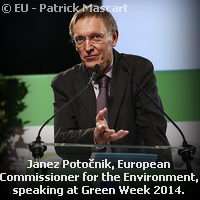A call for a 'circular economy' to preserve resources for the future

By 2050, there will be 9 billion people on our planet and it's expected that we'll need three times more resources than we currently use. At the moment, 80 % of what we use is used once and then discarded. It's clear that we need an alternative to our current 'extract - use - throw away' model.
EU Environment Commissioner Janez Potocnik says that the answer is to move towards a 'circular economy' where nothing is wasted and all resources are continuously mined back into a virtuous circle. However, adapting to this new model undoubtedly requires a mammoth shift in mentality, posing a large challenge to legislators, financial institutions, researchers and businesses in particular.
The Commissioner's call for a circular economy that will 'save resources and create jobs' echoed throughout the Green Week conference in Brussels earlier this month. The concept is based on the re-use, repair, refurbishment or recycling of existing materials and products, and ensuring that all resources are managed more efficiently throughout their life cycle. Essentially, anything traditionally regarded as 'waste' can be turned into a resource.
It all makes good sense but this new order requires a sea change in attitudes and an intense push forward in terms of innovation. 'The circular economy will be the great innovation challenge of the next decades,' the Commissioner admitted. He also warned, 'Those who survive will be those who invested and are ready to compete in a resource-constrained world.'
One example of a company that is embracing the circular economy model and attempting to 'close the loop' is Worn Again in the UK. Led by Cyndi Rhoades, the company is developing a chemical textile recycling technology and closed loop resource model that will enable end of use clothes and textiles to be collected, processed and made back into new yarn, textiles and clothes again and again. The aim is to completely eradicate textile waste.
Cyndi, who joined the Commissioner on stage at Green Week, agreed that innovative recycling technology solutions are key to creating a circular flow of resources. She cited one of Worn Again's major challenges as the attempt to separate mixed fibres of cotton and polyester so that materials are fit to be used again. This action is simply impossible without intense innovation efforts in the laboratories of Worn Again and its partners. 'To close the loop, we need a closed loop technology solution,' Cyndi confirmed.
In contrast to Worn Again, many SMEs in Europe, however, are entrenched in the existing economic model and will find the technological demands and accompanying financial burdens of moving towards a circular economy to be challenging. Rosa Solanes of UEAPME, an organisation representing SMEs at EU level, also spoke at Green Week. She noted, 'SMEs need technological assistance. Simple changes they can implement on their own but when they want to go further, they don't have the capacity... And banks don't take into account resource efficiency when looking at the projects that SMEs propose. Financial institutions also need to be trained into the circular economy.'
Rosa also noted that the examples of keenly green SMEs embracing the circular economy model are impressive but they are not representative of the majority of companies in Europe. 'The examples presented are good but they are the minority. The majority of SMEs are not circular, they are still linear,' Rosa stated.
It seems that these SMEs, along with all of the actors along the resource chain, will have no choice but to adapt. Commissioner Potocnik was adamant that the circular economy will not emerge if individuals, businesses and markets are left to their own devices. 'We need national and international agreements which restrict individual and business behaviour.' With this in mind, it is expected that the Commission will propose binding targets for recycling and public procurement in a Circular Economy package in July.
More information: www.greenweek2014.eu/index.html
Provided by CORDIS





















